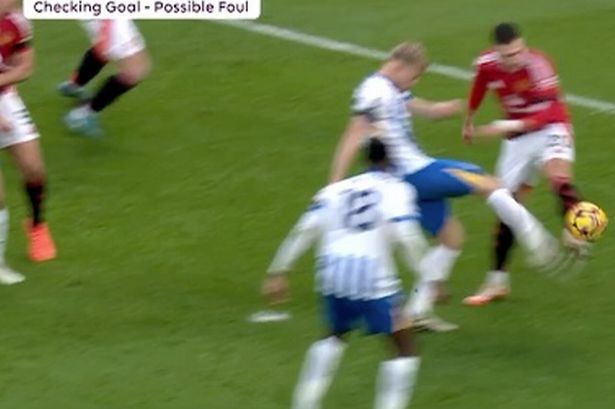The clash between Brighton & Hove Albion and Manchester United at Old Trafford proved a dramatic and controversial encounter, punctuated by a disallowed goal that left Brighton feeling aggrieved. Early in the second half, with the score still locked at 0-0, Brighton orchestrated a slick attacking move that culminated in what they believed to be the opening goal. Joao Pedro, the Brazilian forward, expertly slotted the ball past Manchester United goalkeeper, Andre Onana, sparking jubilant celebrations among the travelling Brighton supporters. However, their joy was short-lived as the Video Assistant Referee (VAR) intervened, casting a shadow of doubt over the seemingly legitimate goal.
After a tense period of review, the VAR officials concluded that Pedro had been offside in the build-up to the goal, albeit by the narrowest of margins. Replays showed that a fraction of Pedro’s boot was beyond the last Manchester United defender as the ball was played towards him. The decision, while technically correct according to the laws of the game, sparked heated debate and underscored the ongoing controversies surrounding the application of VAR in football. Brighton’s players and coaching staff vehemently protested the decision, arguing that the offside was marginal and did not materially affect the play.
The disallowed goal proved to be a pivotal moment in the match. The momentum swung back towards Manchester United, who capitalized on their reprieve and began to exert more pressure on the Brighton defense. The incident injected a palpable sense of frustration into the Brighton ranks, potentially disrupting their rhythm and affecting their subsequent performance. Conversely, Manchester United, buoyed by the overturned decision, seemed to gain renewed confidence and began to play with greater intensity.
The controversy surrounding Pedro’s disallowed goal also reignited the debate about the broader impact of VAR on the game. While proponents argue that VAR ensures greater accuracy and fairness in officiating, critics contend that it often disrupts the flow of the game and leads to marginal offside decisions that undermine the spirit of the sport. The incident at Old Trafford highlighted the inherent difficulties in applying VAR consistently and objectively, particularly in situations where the offside call is incredibly tight. The debate over the technology’s role in the game continues to divide opinion within the football community.
From Brighton’s perspective, the disallowed goal epitomized their misfortune on the day. Despite creating several promising opportunities, they were unable to convert their chances and ultimately succumbed to a narrow defeat. The VAR intervention undoubtedly left a bitter taste in their mouths, as they felt they had been unjustly denied a legitimate goal that could have altered the course of the match. The incident served as a stark reminder of the fine margins that can determine the outcome of football games, especially at the highest level.
The match between Manchester United and Brighton & Hove Albion provided a compelling illustration of the complexities and controversies that surround modern football. The disallowed goal involving Joao Pedro became the focal point of the game, highlighting the ongoing debate over VAR’s impact on the sport. While the technology aims to enhance the accuracy of officiating, its application remains a source of contention and often sparks passionate discussions amongst fans, players, and pundits alike. The incident at Old Trafford underscored the need for continued refinement and clarification of the VAR protocols to ensure that the technology serves its intended purpose without unduly disrupting the flow and excitement of the game. The controversy will undoubtedly continue to fuel discussions about the role of technology in football and its impact on the integrity and enjoyment of the beautiful game.














